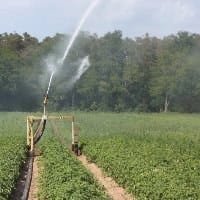(BRUSSELS) – Negotiators from the EU Parliament and Council reached a provisional agreement late Tuesday on strengthening the current provisions for emissions from industry and large intensive rearing farms.
The aim is to further combat air, water and soil pollution from large agro-industrial installations, which can also lead to health problems such as asthma, bronchitis and cancer.
The new rules will make it mandatory to set the strictest achievable emissions levels and push industrial plants to focus more on energy, water and material efficiency and reuse, in addition to fostering the use of safer, less toxic or non-toxic chemicals in industrial processes, through emission or environmental performance targets. To combat water scarcity, environmental performance targets will become obligatory for water consumption. For waste, resource efficiency, energy efficiency and raw material use such targets will be within a range and for new techniques, targets will be indicative.
Co-legislators agreed to extend the IED also to cover extractive industry installations (mines) and large installations manufacturing batteries.
Co-legislators agree to extend IED measures to pig farms with more than 350 livestock units (LSU). Farms raising pigs in an extensive or organic manner, and outside for a significant amount of time in a year, are excluded. For poultry, it would apply to farms with laying hens with more than 300 LSU and for farms with broilers with more than 280 LSU. For farms rearing both pigs and poultry, the limit will be 380 LSU.
The Commission originally proposed a threshold of 150 LSU for all livestock, including for cattle. Co-legislators agreed to task the Commission to review, by 31 December 2026, the need for EU action to address the emissions from the rearing of livestock, including from cattle, as well as a reciprocity clause to ensure producers outside the EU meet requirements similar to EU rules when exporting to the EU.
Negotiators also agreed to increase transparency and public participation in relation to the licensing, operation and control of regulated installations. The European Pollutant Release and Transfer Register will be transformed into an EU Industrial Emissions Portal where citizens can access data on all EU permits and local polluting activities. In addition, systems for e-permitting should be in place at the latest by 2035.
Non-complying companies can face penalties of at least 3% of the operator’s annual EU turnover for the most serious infringements and member states shall give citizens affected by non-compliance the right to claim compensation for damages to their health.
The deal still has to be adopted by Parliament and Council, after which the new law will be published in the EU Official Journal and enter into force 20 days later. Member states will then have 22 months to comply with this directive.
Further information, European Parliament
EP Research: Revision of the industrial emissions directive (05.07.2023)


